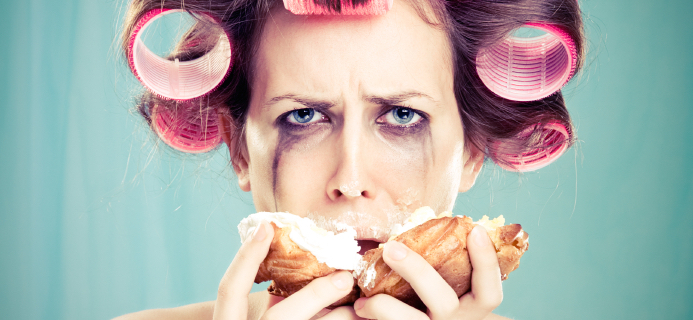Ever had a stressful day, only to eat a bar of chocolate and feel a million times better? Or going through a break-up and find yourself eating an entire tub of ice-cream? Well, there’s a reason for that. Studies show certain foods-mainly sugar, fat and salt trigger the release of endorphins, your feel-good hormones.
Those of us who are self-confessed comfort eaters, food can be pretty tempting in times of stress. But what if these emotional eating episodes are happening frequently and we find ourselves getting out of control? Julie Deane-Williams, a registered dietitian and ADSA (Association for Dietetics in South Africa) spokesperson. And Janet Earl, a Clinical Psychologist weighs in on the least talked about eating disorder- emotional eating.
What is emotional eating?
Julie explains that the clinical term for emotional eating is disordered eating. “This type of eating involves regular patterns of using food to cope with emotional dis-ease,” she says. Disordered eating can take place in various forms; restrictive eating, binge eating, overeating and binging/purging eating.
What is binge eating?
“A binge is classified as eating an amount of food that is larger than what most people eat in a 2 hour period of time” explains Julie. Binging can form part of an emotional eaters habits. She goes on to say that binge eating and emotional eating are linked, and only differ by severity. Not all emotional eaters are binges, they may prefer to eat all day at times of stress and anxiety. There’s often a feeling of lack of control over how much you are eating.
What causes an eating disorder
We all have bad eating habits at some point in our lives. Whether it’s eating fast foods that we know that are bad for us but taste oh so good. Or becoming a bit too much of a health nut and taking healthy eating to the extremes. We live in a society that is obsessed with appearances. Being told that in order for us to be beautiful we would need to be thin. And because of social media, we are faced with images which can at times enforce our insecurities.
Due to these pressures, we are more concerned about our appearance and might participate in occasional dieting. But this “does not typically precipitate disordered eating” says Janet. She adds that “Depression and low self-esteem may promote the transition from normal concern over appearance and dieting to the expression of disordered eating or a clinical eating disorder in vulnerable individuals”. Meaning that some us of more susceptible to eating disorders than others.
When bad eating habits become an eating disorder.
According to Janet, eating problems usually start out with wanting to lose weight. But when your short bout of dieting becomes no longer about losing weight but deeper on a psychological level then you may be in trouble. “An eating habit becomes disordered eating when the primary need it satisfies is psychological and not because of physical hunger” explains Janet. So when eating no longer becomes about nourishing your body and more about filling a void, to block out certain feelings, calm anxiety and enable a feeling of control.
Janet goes on to add that binge eating and eating disorders in general “it is a deeper psychological problem related to underlying disturbances in the development of emotional personality with deficits in the sense of self; identity and autonomy”. Since eating disorders are more than just what you’re eating but rather about your emotions and thoughts, it does require addressing why you eat. The weird thing about emotional eating is that while you’re eating behaviours are “self-destructive, it’s actually an attempt to self-heal”.
What is treatment like?
Battling an eating disorder as complex as emotion and binge eating is difficult and requires some expertise. Working with a dietitian and psychologist would definitely help you get a handle on things and learn healthy eating habits. Julie’s advice for when seeking help from a dietitian to ensure that they have a special interest in treating eating disorders. They would need to understand that the problem is not about having enough willpower or that you can’t stick to a diet. “Thus a dietitian helps a person separate the function of eating (for the body’s nourishment) from the function of feeling (which is about reclaiming her emotional system, and learning how to emotionally self-regulate without using food)” adds Janet. This would also involve some sessions with a counsellor or psychologist to help resolve emotional conflicts.
Seeking professional help will help to teach someone suffering from emotional eating to learn to differentiate from being actually hungry and being emotionally hungry. Treatment may also involve practising a more mindful way of eating. Julie says that mindfulness and the practising of being more present in one’s life can accelerate the process of healing.
Written by: Chandré Davids
Fuente: www.womenshealthsa.co.za
